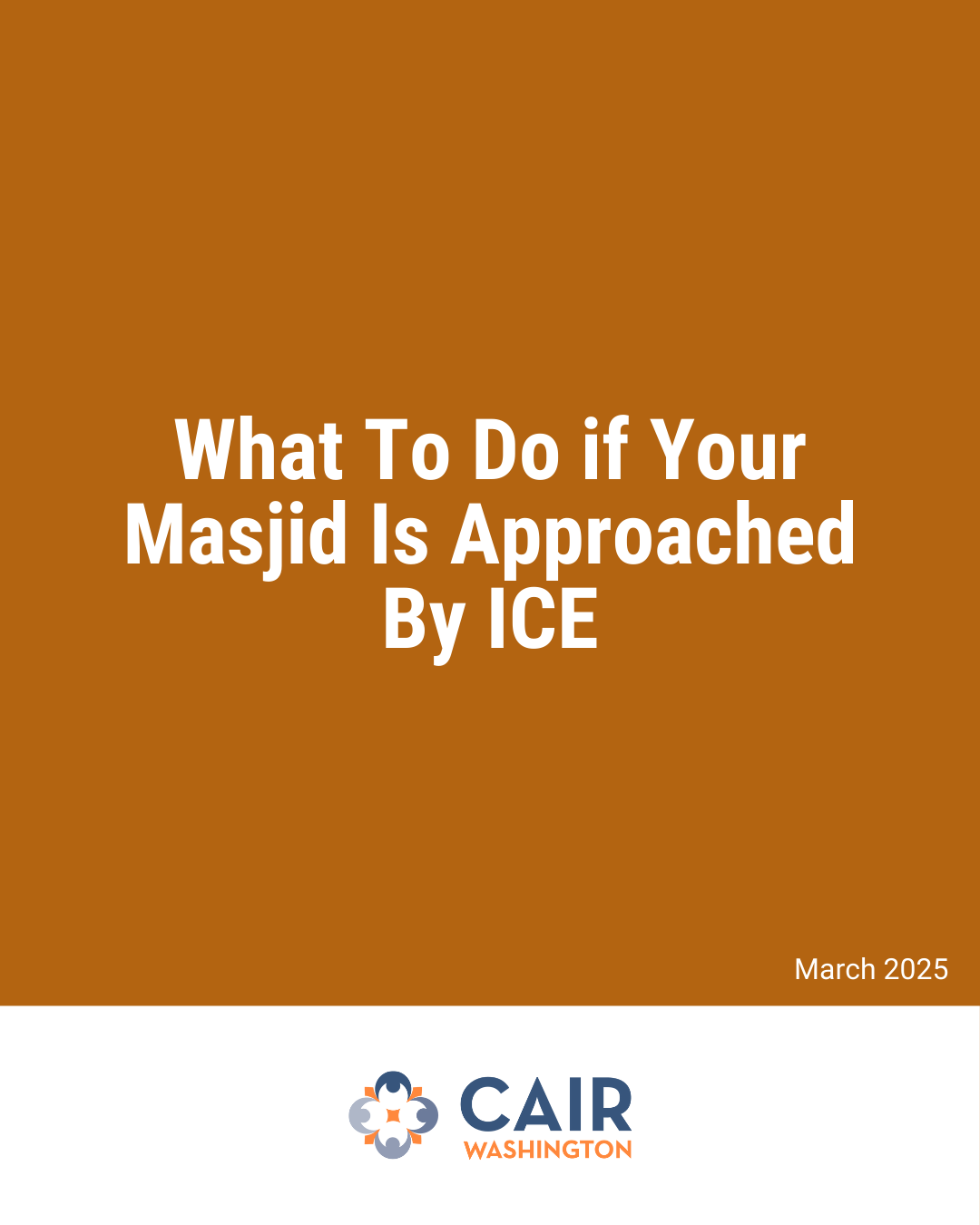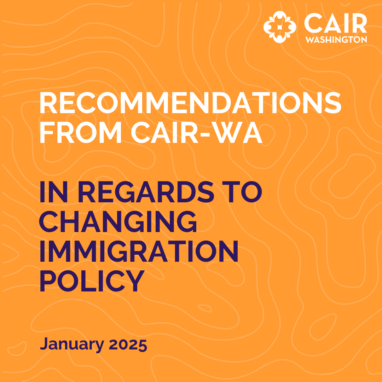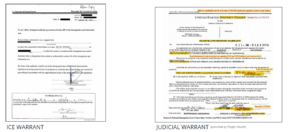Response to 2025 Policy Changes
Resources for Increased Immigration Enforcement
CAIR-WA's Rights and Protections for Targeted Community Includes: Recommendations from CAIR-WA in light of recent Islamophobic harassment Your rights in public places and private places What to do during an ICE encounter at home, at work, or in public What a valid...
Community Advisory on Immigration-Related Announcements
12/3/2025 NEW POLICY MEMO BY USCIS On December 2, 2025 USCIS released a memo which made immediate changes to immigration policies. What has changed All asylum applications are on hold – regardless of country of origin. Any asylum application that is pending with...
Supreme Court Ruling on Birthright Citizenship: What to Know
You may have heard that there was a recent Supreme Court ruling on a case regarding birthright citizenship. Here’s what it means. Quick background Many lawsuits were filed against Trump after he issued an executive order calling to take away the right to birthright...
Community Alert: Information on Denaturalization
In June 2025, the Department of Justice announced that they are prioritizing denaturalization. Denaturalization means taking U.S. citizenship away from Americans. The Department of Justice can take legal action to revoke U.S. citizenship if it was obtained illegally...
2025 Muslim and African Ban
On June 4 2025, President Trump issued a new presidential proclamation expanding the Muslim and African Bans. This order blocks or restricts entry into the United States for nationals of 19 countries—most of which are Muslim-majority, African, or Caribbean. It is...
Best Practices for Traveling with Electronics
Best Practices for Traveling with Electronics: Know Your Rights & Stay Protected Before You Travel: Minimize Risk Travel light: If possible, leave your personal devices at...
Information for community in advance of a travel ban
• We are anticipating Federal policy that will impact travelers and immigrants from Muslim majority countries. • CAIR-WA is in communication with State and Federal Officials to assure we have the most updated information for the community • CAIR-WA is...
What to do if your Masjid is Approached by ICE
What is ICE? ICE refers to the Immigration and Customs Enforcement, a branch of the U.S. Department of Homeland Security. ICE enforces immigration laws within the U.S. and engages in arrests, raids, detentions, deportations, and removal proceedings. ICE can work with...
CAIR-WA’s Guidance on Executive Orders, Jan 22
Supreme Court Ruling on Birthright Citizenship: What to Know
Updated July 3, 2025
You may have heard that there was a recent Supreme Court ruling on a case regarding birthright citizenship. Here’s what it means.
Quick background
Many lawsuits were filed against Trump after he issued an executive order calling to take away the right to birthright citizenship. The lawsuits argued that this order is unconstitutional. District courts blocked Trump’s administration from implementing the order. The case ended up before the Supreme Court.
What the court ruled
On June 27, 2025, the US Supreme Court decided in Trump v. CASA that lower federal courts cannot automatically block nationwide enforcement of policies such as President Trump’s executive order to limit birthright citizenship, unless those injunctions are tailored to the specific parties in a lawsuit
The court did not rule on whether the policy is constitutional; it only addressed the scope of injunctions by lower courts.
What this means for now
The executive order remains temporarily delayed. A nationwide injunction no longer blocks its enforcement everywhere, but lower courts have 30 days to decide how the injunctions should apply. This may lead to inconsistent enforcement in different states, depending on where legal challenges are ongoing.
No child born today or in the near future is being stripped of their citizenship by this decision. The Supreme Court did not rule on whether the Executive Order is constitutional. There are existing protections in place.
What you need to know right now
Birthright citizenship is still legally secure under the 14th Amendment and no immediate changes have taken effect. States and various advocacy groups are mobilizing through lawsuits, including class actions to safeguard citizenship rights locally and nationally.
What to expect in the coming weeks
Over the coming weeks, lower courts will determine how broadly or narrowly to enforce injunctions. This will impact which states are protected. Activists and lawyers are preparing new legal actions to preserve universal citizenship protections.
In summary
Nothing has changed yet. Birthright citizenship remains protected. The Supreme Court’s ruling focused on procedural limits for nationwide blocks and did not decide on actual citizenship law. Multiple legal efforts are already underway to defend universal citizenship rights. We will keep you informed, especially if these changes begin to affect birth certificates, benefits, or services in Washington State.
Community Alert: Information on Denaturalization
Updated July 1, 2025
In June 2025, the Department of Justice announced that they are prioritizing denaturalization. Denaturalization means taking U.S. citizenship away from Americans.
The Department of Justice can take legal action to revoke U.S. citizenship if it was obtained illegally or through hiding important facts or making false statements. The Civil Division indicated that they will give top priority to pursuing denaturalization in all cases allowed by law and backed by evidence.
What kind of cases are they looking at?
Individuals who fit the following descriptions may be at risk for denaturalization.
- Individuals who may pose a threat to national security due to links to terrorism, espionage, or the illegal export of sensitive U.S. goods, technology, or information.
- Individuals who have engaged in torture, war crimes or other human rights violations.
- Individuals involved in supporting or advancing the illegal activities of criminal gangs, drug cartels, or transnational organizations.
- Individuals who have committed felonies not disclosed during the naturalization process.
- Individuals who committed human trafficking, sex offenses, or violent crimes.
- Individuals who committed financial fraud against the United States, including PPP loan fraud and Medicaid or Medicare fraud.
- individuals who engaged in fraud against private individuals, funds, or corporations.
- Individuals who obtained U.S. citizenship through corruption, fraud, or false information, and do not fall under another priority category.
- Individuals referred by a U.S. Attorney’s Office or linked to pending criminal charges that don’t fall under another priority category.
- Other cases referred to the Civil Division that are considered important enough to pursue.
If you are concerned about your status or citizenship, and are a Muslim living in Washington state, reach out to CAIR-WA at cairwa.org/gethelp.
2025 Muslim and African Ban
Updated June 5, 2025
On June 4 2025, President Trump issued a new presidential proclamation expanding the Muslim and African Bans. This order blocks or restricts entry into the United States for nationals of 19 countries—most of which are Muslim-majority, African, or Caribbean.
It is scheduled to take effect at 9:01 pm Pacific on Sunday, June 8.
Who Is Affected
This order:
- Fully suspends both immigrant and nonimmigrant entry from 12 countries: Afghanistan, Burma, Chad, Republic of the Congo, Equatorial Guinea, Eritrea, Haiti, Iran, Libya, Somalia, Sudan, and Yemen.
- Partially suspends entry from seven additional countries, including Cuba, Venezuela, Laos, and Sierra Leone.
- Applies only to individuals who are outside the U.S. on June 9 and do not already have a valid visa.
If You Are Abroad Right Now
- If you are from one of the listed countries and already have a valid U.S. visa, this order does not apply to you.
- If you are a green card holder or a dual national traveling with a passport from a non-banned country, the order does not apply to you.
- You should travel with your valid visa or green card.
- That said, if you are eligible to enter, please consider attempting to return to the U.S. before the ban takes effect.
If You Are Inside the U.S.
- The order does not change your legal status or impact you if you are already inside the U.S. and have a valid visa.
- If you are from a listed country and do not have permanent status, we advise against international travel for the time being.
- If you are undocumented or fear future enforcement, reach out for a legal consultation and Know Your Rights resources.
What else to know
- Expect slow processes in immigration at the Port of Seattle and other entry points to the U.S.
- We are continuing to monitor challenges, changes in policy, and will keep the community informed.
- We fought the bans in Trump’s first presidency, and we will fight this one too, insha’Allah.
When to reach out to your local CAIR chapter
- If you or your loved ones are affected, please reach out to your local CAIR chapter. We can help you assess travel risks, provide you with low-cost legal services, and provide updates as the situation evolves.
- If you are affected by this policy, your story can help those who are fighting to change it.
- For WA: If you are a Washington state government employee whose work is affected by this policy, please reach out to us.
Where to call:
- CAIR-WA: 206-367-4081 or our online intake form
- WAISN (Washington Immigration Solidarity Network) Deportation Defense Hotline (Monday-Friday; 6am-6pm) at 1-844-724-3737.
- American-Arab Anti-Discrimination Committee (ADC) 24/7 Emergency Legal Hotline at
Other Travel Ban Resources
Information for community in advance of a travel ban
March 15, 2025
• We are anticipating Federal policy that will impact travelers and immigrants from Muslim majority countries.
• CAIR-WA is in communication with State and Federal Officials to assure we have the most updated information for the community
• CAIR-WA is recommending to not travel during this time to avoid being impacted by the travel ban
• We expect this forthcoming travel ban guidance to include extra surveillance and scrutiny. We recommend scrubbing or deleting social media accounts.
Citizens are fine to travel but if you are Muslim, you should expect extra scrutiny and security checks at airports. Extra scrutiny may include looking at devices.
If you have to travel internationally
What to know
• CBP can access personal, confidential and sensitive data at the border
• Your rights are limited at the border
• You may be denied entry or boarding or your device may be confiscated if you refuse to provide access.
Recommendations – limit and protect personal data
• If you can, leave your phone and devices at home
• If you have to take your phone, delete or password protect sensitive apps and encrypt personal information
• Turn off devices during travel and at border crossings
Where to call:
- CAIR-WA: 206-367-4081 or our online intake form
- WAISN (Washington Immigration Solidarity Network) Deportation Defense Hotline (Monday-Friday; 6am-6pm) at 1-844-724-3737.
- American-Arab Anti-Discrimination Committee (ADC) 24/7 Emergency Legal Hotline at
Links and Resources
Muslim Advocates’ Travel Advisory (March 2025)
Know Your Rights with ICE – Immigrant Defense Project
When ICE is Watching: Know Your Fight, Protect Your People
Trump’s Executive Actions: Impact on Immigration Benefits and Processing
What To Do if Your Masjid Is Approached By ICE
What is ICE?
Who is at risk for targeting by ICE?
- Noncitizens without immigration status.
- Noncitizens who have violated the terms of their immigration status.
- Generally, ICE prioritizes people:
- With certain types of criminal convictions,
- With prior orders of deportation, or
- Who are believed to be a threat to national security.
What are my rights as an individual in ICE interactions?
- Remain silent: you do not have to answer questions about your immigration status.
- Speak to a lawyer: you should not sign anything without a lawyer.
- Request a phone call: contact your consulate if you are a foreign national.









































